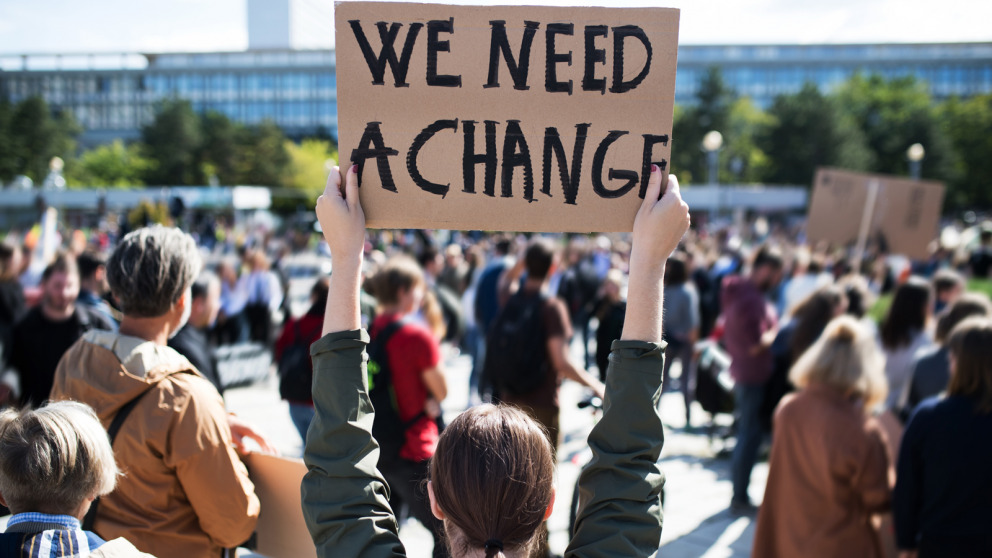Sustainability needs diverse change agents
18.03.2022

The Klaus Töpfer Sustainability Fellowship of the IASS was established in honour of its founding director Prof. Dr Klaus Töpfer. It supports people who, like him, are committed to sustainable development. Applications for the Klaus Töpfer Sustainability Fellowship in 2023 are currently open, and the application deadline has been extended to April 17 2022. The fellowship seeks change agents who build bridges between science, politics, and society. Since 2019, it has been awarded once a year to individuals in Germany and abroad who have been working on sustainability for several years. During the fellowship, they implement innovative ideas that shape the path to a sustainable society, become leaders in developing a common understanding of sustainability challenges, and propose solutions and ways forward with a view to collaborating with diverse actors. The projects led by previous and current Klaus Töpfer Fellows show how diverse these paths can be.
The first Klaus Töpfer Sustainability Fellow, Dr Nicole de Paula, founded the Women Leaders for Planetary Health network and has joined the Food and Agriculture Organization as a Senior Expert for the Sustainable Development Goals. Energy engineer and network economist Dr Natalia Realpe Carrillo, director of HEDERA Sustainable Solutions, established the research network Impact-R - Action-Based & Impact-Driven Research, or “Impact-R” for short. The Impact-R network creates a collaborative framework for scientists, financial service providers, basic service suppliers and sustainability-focused companies aiming to support organizations in implementing digital tools for impact assessment to understand, identify, improve, and monitor achievements in satisfying people’s basic needs in rural areas in developing countries. It addresses microfinance institutions, non-governmental organizations, cooperatives and technology providers alike. Impact-R contributes to the interdisciplinary assessment of green, inclusive financing options for sustainable development projects.
One particular concern of the network is to achieve the Sustainable Development Goals (SDG) in remote rural communities in developing countries. Private households should have access to "affordable and clean energy" (SDG 7) and "clean water and sanitation" (SDG 6), they should not suffer hunger (SDG 2), and multidimensional poverty should be eradicated (SDG 1). A map provides an overview of participating actors from science, industry and civil society.

Researchers and practitioners compile household data through surveys on energy, water and sanitation supply and food security. They evaluate the data and share the results with organizations to develop programmes to address these households’ needs. This research is then used to develop action steps with different types of stakeholders, from researchers up to impact investors. Specific recommendations include how organizations can implement on-the-ground access to energy, water, and sanitation for vulnerable populations and how international frameworks can be used to track SDG-related achievements over time.

Prof. Dr Louis Kotzé aims to develop a new legal paradigm for the Anthropocene, called Earth system law. His research suggests that existing environmental law principles such as sustainable development and “polluter pays” that have been created within the context of a Holocene mindset have become unfit for purpose in the Anthropocene. Developed since the 1970s to “manage” the environment for human benefits, they are out of touch with novel planetary governance challenges emanating from within complex interconnected Earth system transformations as they continue to reinforce a predatory neoliberal development paradigm. The Anthropocene instead demands a new governance mindset that is undergirded by Earth-centred legal principles to guide law and policymakers to develop law for the Anthropocene.
Louis Kotzé’s project specifically endeavours to identify and elaborate radically different legal principles, within the context of the recently proposed Earth system law framework, to regulate human behaviour in a new and radically different Anthropocene epoch. Earth system law is an innovative legal imaginary that is rooted in the Anthropocene’s planetary context and its perceived socio-ecological crisis. It is aligned with, and responsive to, the Earth system’s functional, spatial and temporal complexities and the multiple Earth system science and social science-based governance challenges arising from a no-analogue state in which the Earth system currently operates. Fully embracing the need to guide the making of desirable planetary futures, Earth system law potentially offers: an intra-, inter- and trans-disciplinary analytical framework to better understand and respond to Earth system governance challenges; the normative foundations to govern the full spectrum of Earth system relationships in a way that promotes planetary justice; and the legal means to facilitate transformative governance for long-term sustainability.
Louis Kotzé’s project considers various different aspects that often also reach well beyond the law. For example, he explores how democratic processes can drive planetary transformations. He considers interdependencies and interactions between nature, technology, and society. He analyses how perceptions, values, and orientation within society as well as by individuals influence change, not only of society, but also of the law itself. And he observes how the law can drive innovation and social change that can collectively accelerate the shift to ecological sustainability.
We look forward to welcoming our future Klaus Töpfer Fellow 2023 and continue ground-breaking innovation, understanding, and guiding processes of societal change towards sustainable development. Founder of the Women Leaders for Planetary Health network Dr Nicole de Paula, Energy engineer and network economist Dr Natalia Realpe Carrillo and international law specialist Prof. Dr Louis Kotzé all take different approaches, but they have in common that they show us innovative paths towards a sustainable society. And all three underline: The future is happening right now.

